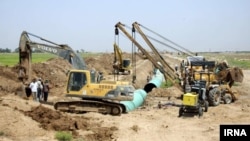Residents of southwestern Iran say their water supplies have been dangerously polluted for days despite pledges by Iranian authorities to quickly resolve the problem.
Residents of the Khuzestan provincial cities of Khorramshahr, Abadan and Ahvaz contacted by VOA Persian on Wednesday said they continued to experience shortages of clean running water.
Iranian officials have told state media that clean water supplies will be restored to cities in Khuzestan by Friday as part of the next phase of a water distribution project called Ghadir. The provincial residents who spoke to VOA Persian said they had seen no signs of the government fulfilling its pledge.
Purified-water shortages in the region drew hundreds of demonstrators to the streets of Khorramshahr last Friday in one of the biggest water-related protests that Iran has seen this year. Protests in Khorramshahr turned violent on Saturday night, with police firing tear gas at demonstrators and gunfire heard in video posted on social media. Iranian state media said 11 people were wounded, 10 of them officers. Iran's judiciary also confirmed the arrest of 10 protesters.
Social media users also have reported protests against water shortages in Abadan and the provincial capital of Ahvaz in recent days.
A resident of Khorramshahr said Wednesday that security remained tight in the city, with police using concrete barriers to block roads leading to a central square where the protests began Friday. The resident also said he had heard from friends that police were detaining demonstrators indiscriminately. It has been difficult to verify the situation in Khorramshar, given the lack of independent media access.
Other locals who spoke to VOA Persian last week said they also blamed the water crisis on suspected government transfers of scarce water supplies to Iraq and nearby Kuwait.
Last month, some Khuzestan residents broke open and filmed a pipe carrying fresh water toward the Iraqi border, a revelation that outraged many locals as the video spread on social media. Iranian Energy Minister Reza Ardakanian responded to the allegations by denying that Iran had been selling fresh water to neighboring countries.
This report was produced in collaboration with VOA's Persian service. Michael Lipin reported from Washington.




